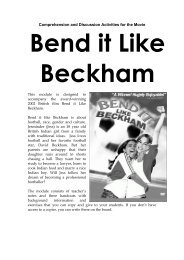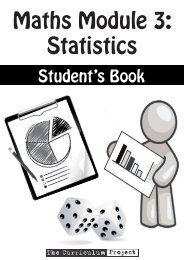Download - The Curriculum Project
Download - The Curriculum Project
Download - The Curriculum Project
You also want an ePaper? Increase the reach of your titles
YUMPU automatically turns print PDFs into web optimized ePapers that Google loves.
6.3 Idiomatic phrasal verbsThis exercise focuses on idiomatic phrasal verbs. <strong>The</strong>se verbs have meanings that are different from themeanings of their separate parts.A. Students look the verbs in the box, and guess their meanings. Elicit definitions if you like.B. Students match the verbs in the box with these synonyms.Answers: continue – carry on understand – figure out collect – pick up stop – give uprefuse – turn downC. Students put the verbs into their past tense forms.Answers: threw away turned up turned down went on set up hurried uplooked after looked up figured out gave up carried on picked up grew upD. Students fill the gaps with the verbs in the box. Some of them need to be put into the past tense.Answers:1. Hurry up 2. set up 3. looked up 4. grow up 5. Carry on 6. turned up7. pick up 8. figure out 9. gave up 10. look after 11. turned down 12. throw awayE. Students complete the sentences.Possible answers:1. Someone turned up at my house yesterday afternoon.2. Please throw away that ugly old hat.3. I grew up in a small village near Sittwe.4. We set up a committee to organise the festival.5. Hurry up or we’ll miss the train!6. I can’t figure out the answer.If students want more information about phrasal verbs, tell them to read the Phrasal verbs section of theLanguage Reference.7. Writing: Charts and StatisticsThis section focuses on statistics and charts, and how students can interpret and write about them. Itcovers the use of bullet points, which are commonly used to present lists of facts or opinions.7.1 StatisticsA. Students answer the questions.Answers:1. Australia is the richest. Bangladesh is the poorest.2. In general, rich countries damage the environment more.B. Pre-teach consume, emit, barrel (used to measure oil – about 159 litres), tonne (1,000 kilograms),waste (rubbish, stuff that is not used). Students look at the chart and match the verb with the type ofstatistic each line in the chart focuses on.Answers: emitted – carbon dioxide produced – waste born – babies72 Module 12Language/Culture Notes1. Sometimes phrasal verbs have a slightly different meaning or use from their synonyms. For example,figure out means ‘to come to know the answer, method or reason by thinking about it’, e.g. I can’t figureout how to play the video. It is not correct to say I can’t figure out the radio because it’s too quiet. But it isuseful for students to know the synonyms so they can understand the approximate meanings.2. Many phrasal verbs have more than one meaning. For example, take off can mean:i. to remove an item of clothing. (<strong>The</strong> man took off his shirt.)ii. when a plane leaves the ground. (<strong>The</strong> plane took off at 8.00.)iii. to reduce the price of an item. (<strong>The</strong>y’ve taken 10% off the price of this shirt.)iv. when something new suddenly becomes popular. (<strong>The</strong> new bakery has really taken off.)This is the same as many other vocabulary items in English. In this module, we only show one meaningof the verbs used.



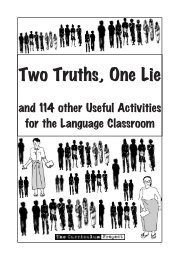
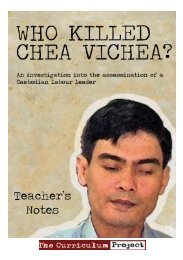
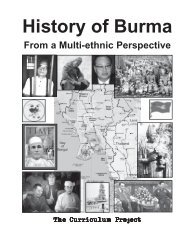
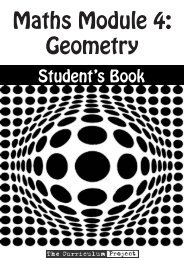

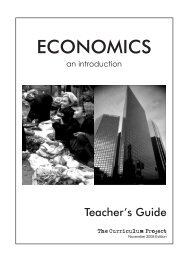
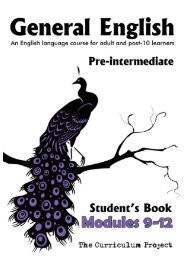

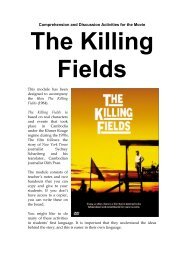
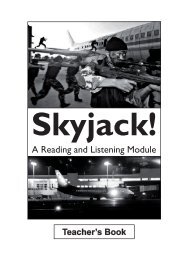
![[Eng] Nov 2012 DRAFT - The Curriculum Project](https://img.yumpu.com/45590859/1/184x260/eng-nov-2012-draft-the-curriculum-project.jpg?quality=85)
